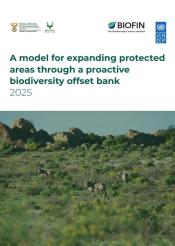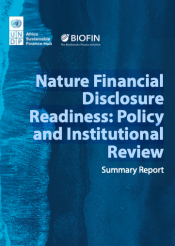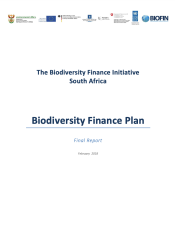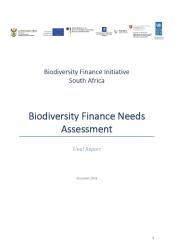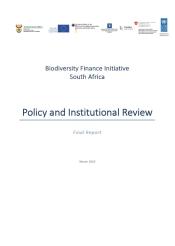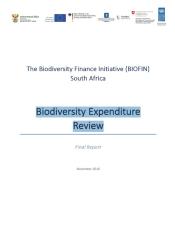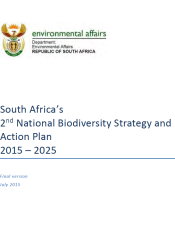South Africa
South Africa ranks as the third most biodiverse country in the world. It is recognised for high levels of endemism and is home to over 95,000 known species. The country also boasts a diverse range of biomes, from forests to deserts, estuaries and marine systems. Biodiversity, ecological infrastructure, and associated ecosystem services act as an invaluable foundation for South Africa’s economy. From tourism to fishing, farming and industry, the products and services provided by nature support people’s wellbeing, livelihoods, jobs and security.
BIOFIN in South Africa is implemented by UNDP Country Office and the national Department of Environmental Affairs, in collaboration with the SANBI, SANParks, National Treasury and Statistics South Africa. The BIOFIN programme in South Africa is currently implementing 8 Finance Solutions
2025 Key Updates and Results
|
Finance Solution |
Activity Implementation |
Impact |
Impact as per BIOFIN Criteria |
Investment by BIOFIN |
ROI |
|
Improving the effectiveness of biodiversity offsets |
90% complete with only training deliverable outstanding |
The establishment of a 17000ha offset bank (new land added to PA)
The establishment of a biodiversity proactive banking modality which is now being used in the western cape and by Isimangaliso
The 500 ha of the offset bank have been sold |
|
USD150,000
(ZAR2,7M) |
ZAR1,6M capital upront and ongoing management fees of ZAR100k increasing at CPIX for 30 years
USD 255,555 |
|
Biodiversity investment portal
|
100% complete |
Establishment of South Africa first BSIP. |
Institutionalisation: The BSIP has been wholly taken over the GoSA
Financial: USD450,000 raised |
USD275,0000 |
USD450,000
ZAR5,000,000 aloocated by GoSA towards maintenance of site |
|
Improving fees for permits
|
80% |
Increase of fees and permits related to TOPS
Ongoing increase of fees for AIS |
Financial: 5.6% increase approved by NT
|
USD95,000 |
To be quantified |
|
Wildlife Certification scheme |
90% complete |
Wildlife Certification scheme has been set up and is ready to deploy |
Biodiversity:
Institutionalization: A certification body has been set up
Institutionalisation: The scheme is part of the Sas biodiversity economy strategy and G20 work
|
USD185,000 |
|
|
Rates and taxes for Protected Areas |
100% |
Some municipalities have begun correctly implementing section 17 of the MPRA |
Financial: USD123,580 SAVED |
USD68,571 |
USD 123,580 TO DATE |
South Africa has prioritised 15 finance solutions, which collectively aim to address the three main areas of work:
- Protected areas;
- Ecosystem restoration; and the,
- Sustainable utilisation of biodiversity.
These are the finance solutions that are currently being implemented by the South African country office:
- FS 1: Growing protected area own revenue;
- FS 2: Reform of property rates legislation, interpretation and application to protected areas;
- FS 3: Building a sustainable financing model to adequately fund the biodiversity stewardship programmes;
- FS 4: Institutional support for biodiversity tax incentives;
- FS 5: Improved biodiversity offsets modality for protected area expansion;
- FS 6: Development and implementation of a voluntary market-based certification scheme in the wildlife sector;
- FS 7: Developing and promoting an online Biodiversity Economy Investment Portal;
- FS 8: Improve the effectiveness of permits;
In 2021 and 2022 the BIOFIN South Africa project received funding to undertake two additional studies. Although these two are not full finance solutions, for the purpose of project management and reporting they have been informally dubbed
- FS 9: The impact of subsidies and incentives on the biodiversity of South Africa
- FS 10: Nature Financial Disclosure Readiness Policy and Institutional Review
The PIR saw the review of the policy and practice drivers of biodiversity and ecosystem change, and the analysis of the key actors and institutions, and their relationship to biodiversity drivers and biodiversity finance.
The BER seeks to understand primarily public sector expenditure on biodiversity across South Africa. This included all three spheres of government and considered expenditure both within the environmental sector, as well as expenditure on biodiversity flowing from other sectors, such as agriculture and forestry. Some private sector expenditure was also analyzed, particularly from NGOs and private protected areas.
The FNA aimed to provide a cost estimate for implementing the recently revised NBSAP, and attempted to estimate the finance gap for biodiversity in the sector. The FNA indicated that major areas needing finance solutions were ecosystem restoration and protected area expansion and management.
The BFP presents a suite of finance solutions designed to address the finance gap in a comprehensive and complementary manner. Some 15 finance solutions have been prioritised, clustered around ecosystem restoration, protected area expansion and management, and the sustainable use of biodiversity.
